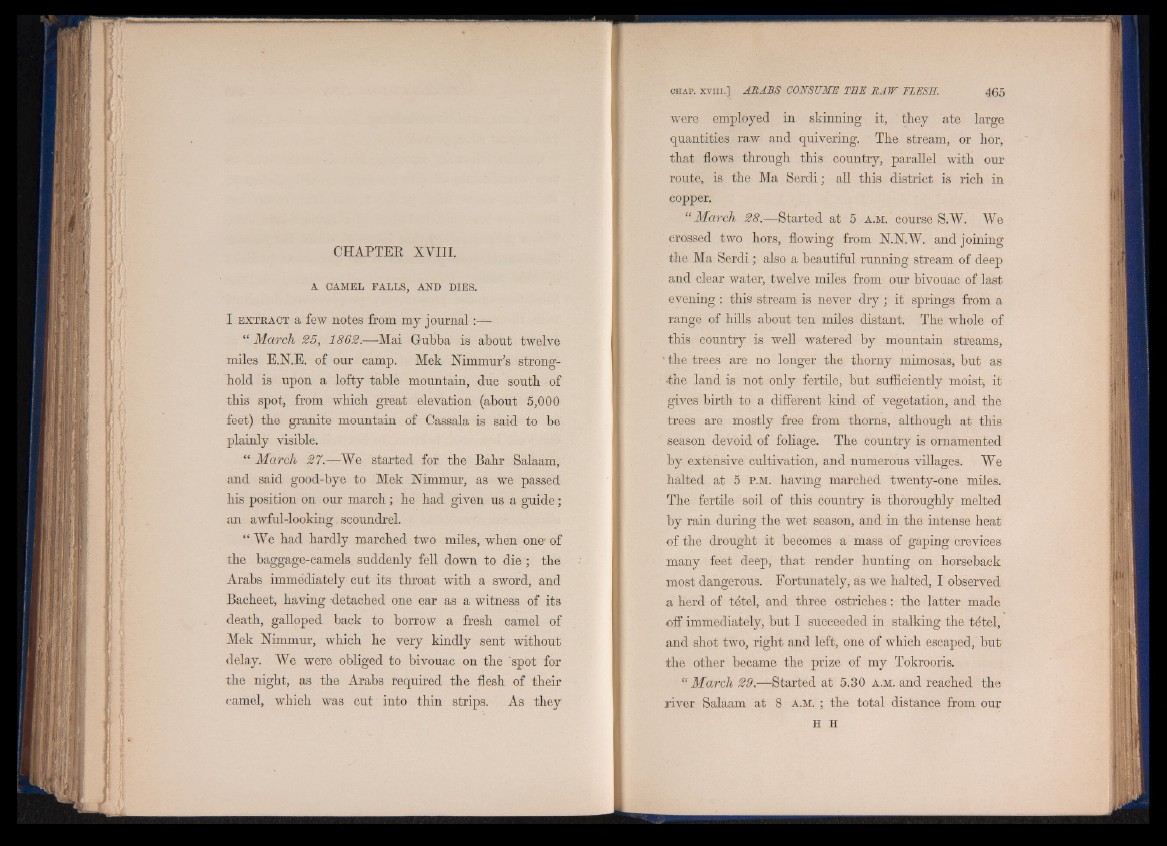
CHAPTER XVIII.
A CAMEL FALLS, AND DIES.
I extract a few notes from my journal
“ March 25, 1862.—Mai Gubba is about twelve
miles E.N.E. of our camp. Mek Nimmur’s strong-
bold is upon a lofty table mountain, due south of
this spot, from which great elevation (about 5,000
feet) the granite mountain of Cassala is said to be
plainly visible.
“ March 27.—We started for the Bahr Salaam,
and said good-bye to Mek Nimmur, as we passed
his position on our march; he had given us a guide;
an awful-looking. scoundrel.
“ We had hardly marched two miles, when one- of
the baggage-camels suddenly fell down to die; the
Arabs immediately cut its throat with a sword, and
Bacheet, having detached one ear as a witness of its
death, galloped back to borrow a fresh camel of
Mek Nimmur, which he very kindly sent without
delay. We were obliged to bivouac on the spot for
the night, as the Arabs required the flesh of their
camel, which was cut into thin strips. As they
were employed in skinning it, they ate large
quantities raw and quivering. The stream, or hor,
that flows through this country, parallel with our
route, is the Ma Serdi; all this district is rich in
copper.
“ March 28.—Started at 5 a .m. course S.W. We
crossed two hors, flowing from N.N.W. and joining
the Ma Serdi; also a beautiful running stream of deep
and clear water, twelve miles from our bivouac of last
evening : this stream is never dry ; it springs from a
range of hills about ten miles distant. The whole of
this country is well watered by mountain streams,
' the trees are no longer the thorny mimosas, but as
•the land is not only fertile, but sufficiently moist, it
gives birth to a different kind of vegetation, and the
trees are mostly free from thorns, although at this
season devoid of foliage. The country is ornamented
by extensive cultivation, and numerous villages. We
halted at 5 p.m. having marched twenty-one miles.
The fertile soil of this country is thoroughly melted
by rain during the wet season, and in the intense heat
of the drought it becomes a mass of gaping crevices
many feet deep, that render hunting on horseback
most dangerous. Fortunately, as we halted, I observed
a herd of tetel, and three ostriches: the latter made
off immediately, but I succeeded in stalking the tetel,
and shot two, right and left, one of which escaped, but
the other became the prize of my Tokrooris.
“ March 29.—Started at 5.30 a .m. and reached the
river Salaam at 8 a .m. ; the total distance from our
H H